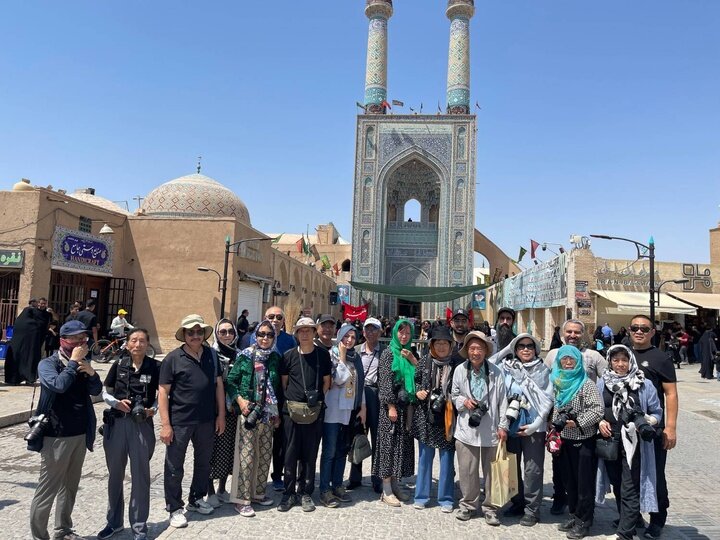Yazd welcomes foreign visitors for Arbaeen commemoration

TEHRAN—A number of foreign travelers to Yazd have visited mourning ceremonies held in the 12th-century Friday Mosque of the oasis city.
The Jameh Mosque of Yazd, one of the most important historical monuments of Iran, was the venue for the Arbaeen ceremonies on September 6.
After paying their respects at the mosque, the foreign tourists embarked on a journey of faith and spirituality by walking the path from Yazd to Taft. The walk is traditionally taken by Shia Muslims to honor Imam Hussein (AS), who was martyred in a battle in Karbala, Iraq, in 680 CE.
The mass rally is considered a pilgrimage, and it is estimated that millions of Shia Muslims from all over the world participate in it every year.
Yazd has long been a destination for domestic and foreign tourists who are willing to witness centuries-old mourning ceremonies held during the months of Muharram and Safar.
Holidaymakers may attend mourning ceremonies, such as Nakhl-Gardani or Nakhl-Bardari, which is a symbolic representation of the Imam’s coffin, resembling an Imam’s funeral; Tazieh, a passionate play inspired by historical and religious narrations; and Sineh-Zani [beating the chest].
Muharram and the following month, Safar (which includes a commemoration of the aftermath of Karbala) are a period of lamentation for Muslims. War and fighting are prohibited during Muharram and festivities like weddings and birthdays are usually postponed to more appropriate days. People generally wear black out of respect or at least avoid wearing very bright colors.
They say the core meaning of Muharram is beyond such mere bereavement and commemoration of the past. Karbala was an actual and metaphorical venue where the Truth confronted the Lie, where justice spoke vibrant and audible in the face of prejudice, and where courage, passion, and devotion preceded attachment, worldliness, and obstinacy.
A UNESCO World Heritage since 2017, the historical core of Yazd is chockful of mudbrick houses, bazaars, public bathhouses, water cisterns, mosques, synagogues, Zoroastrian temples, and centuries-old gardens. From the divine point of view, the city enjoys the peaceful coexistence of three religions: Islam, Judaism, and Zoroastrianism.
Yazd is regularly referred to as a delightful place to stay, or a “don’t miss” destination by almost all of its visitors. The city is full of mudbrick houses that are equipped with innovative badgirs (wind catchers), atmospheric alleyways, and many Islamic and Iranian monuments that shape its eye-catching city landscape.
AFM
